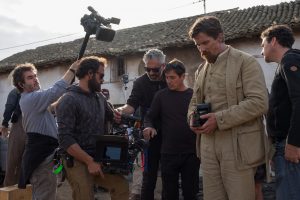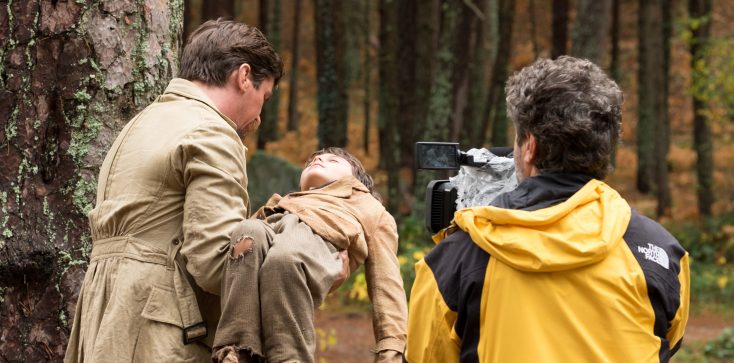
Documentary filmmaker Joe Berlinger (left) films Christian Bale (right center) and crew on the set of THE PROMISE. ©Survival Pictures LLC. CR: Jose Haro
By ANGELA DAWSON
Front Row Features
HOLLYWOOD—Various attempts over the years to make a Hollywood studio feature film about the Armenian genocide have been thwarted, including an attempt by legendary producer Irving Thalberg to make a film about the subject in the 1930s. The U.S. State Department intervened on behalf of the Turkish government and “The Forty Days of Musa Dagh” was shelved. For those unaware, an estimated 1.5 million Armenians and other minority Christian populations were systematically exterminated and cast out by the Ottoman Turks a century ago. To this day, Turkey categorically refuses to acknowledge the genocide but Armenian descendants continue to press their cause around the world. Because Turkey has long been a strategic American military ally in Eurasia, no U.S. President—Democrat or Republican—has ever officially has acknowledged the extermination of more than a million of innocent civilians as a genocide, although some have referred to it an atrocity.
Last year, an independently financed big-budget production feature film was made by acclaimed director Terry George (“Hotel Rwanda”) that starred Christian Bale, Oscar Isaac and Charlotte Le Bon. “The Promise” told a love-triangle story set against the backdrop of the Armenian genocide, and cost a reported $100 million to make. Though the film generally received positive critical reviews, it failed to garner traction at the box office. To date, the epic drama has made just over $8 million.
During filming of “The Promise” in Portugal, the production was joined by Oscar-nominated film documentarian Joe Berlinger (“Paradise Lost 3: Purgatory”), known mostly for his cinema verite style of filmmaking on contemporary subjects. Berlinger’s “Intent to Destroy: Death, Denial & Depiction,” follows George’s heroic efforts to make a sweeping historic film that probed the tragedy, while also explaining the history of the genocide and the decades of cover-up and deception that has followed.
The prolific Berlinger (who also has helmed acclaimed documentaries on heavy metal band Metallica, notorious criminal James “Whitey” Bulger and more) spoke by phone about tackling a subject matter that has long interested him, embedding his crew with “The Promise” production and making his upcoming SundanceTV miniseries about the Clutter family murders that were the subject of Truman Capote’s “In Cold Blood.”
Q: Was it the subject matter or was it the opportunity to follow another filmmaker that drew you to make “Intent to Destroy: Death, Denial & Depiction?”
Berlinger: Definitely the subject matter. I’ve been long fascinated by the Armenian genocide and the fact that it’s contested history when, in fact, the historical record is pretty straightforward, and it shouldn’t be contested history. As an American Jew, I’ve always been deeply obsessed with the Holocaust, which has these tentacles to the Armenian genocide. It’s a subject that’s always interested me but I never thought as a filmmaker it would be something that would be interesting to me to make a film about. I’m a cinema verite who likes to file stories in the present tense as they are unfolding. That’s what I’m comfortable with—like “My Brother’s Keeper,” “Paradise Lost,” “Whitey.” Those films are much more classic verite. So, while the subject matter has always been intriguing to me and there have been other documentaries about it and because I’m not a historical filmmaker—none of my films are talking heads and archival footage—so I never saw a way in until I heard “The Promise” was being made. That’s when I pitched them that it would be a cool feature documentary idea to use the making of “The Promise” as my kind of structural glue to tell this larger story.
I also saw a much more important reason for wanting to embed with “The Promise” to tell the Armenian genocide story because, to me, what’s more interesting than just the basic facts of the genocide, which has been done before, but what hasn’t been done before, and I think my film adds to the dialogue, is kind of a dissection of denial. How denial works and how it’s worked in this case. How the story has been dented by this many decades-long campaign to kind of sweep it under the rug, including by Hollywood. That’s why the making of (“The Promise”) becomes so important as a structural device, not just gratuitous behind-the-scenes.
This has been a subject that’s taboo in Hollywood. The fact that a film was finally coming out, not by a Hollywood studio—I think, even today, a Hollywood studio would not tackle this subject matter—to me I found that fascinating and troubling that there is still on some topics censorship in Hollywood. So, by embedding with the promise, it allowed me to tell that larger story. That’s why I consciously divided it into three chapters. It allowed me to tell a larger story in a way that’s more digestible to an audience.
Q: How tricky was it weaving the history together with the making of “The Promise?”
Berlinger: I had a great editor, Cy Christiansen. He and I rolled up our sleeves. I’ve never worked harder on the structure and edit of a film before. It was a very difficult task. We spent a significant amount of time in the editing room. I think this does what a good documentary should do—it takes you into a world you know nothing about. It teaches you something. It illuminates something. It gives you a good story to absorb into for two hours. It was a challenge to achieve the right edit to get the balance to get behind-the-scenes, with the history.
Q: There was some talk about the viewer reviews being manipulated afterwards?
Berlinger: When “The Promise” premiered at the Toronto Film Festival, a day or two before the first screening when the film was under wraps, if you went onto IMDB there was already 5,000-6,000 negative reviews. There were already nasty comments about the film by the first screening in Toronto. Maybe 2,000 people had seen the film and there were already 10,000-15,000 negative comments by the end of the first week.
Q: How much were you on set? Did you feel like you had good access to Terry George and the actors?
Berlinger: I was there for quite a bit. The film shot for about 76 days and I was there about 35 of them. So, I was there about half the days. It was a process of building trust. If this had been a studio movie rather than a film that was independently financed, they never would have allowed a filmmaker to have as much access as I had. The fact that it was independently made and about building relationships and building trust, I felt like I was allowed to put my camera anywhere, and I had terrific access.
Obviously, there are moments when you can’t intrude but Terry and I had a great rapport. We’re very much kindred spirts in the type of subject matter we are interested in—the social justice subject matter that we’ve both tackled in the past. I was a big fan of “Hotel Rwanda” and “In the Name of the Father,” and he was a big fan of (my work) so we were two filmmakers with different approaches both tackling this material and felt comfortable with each other. He was very generous with the amount of time and space he gave me on that set.
Q: The film cost $100 million to make and didn’t do well at the box office? What do you think was the problem?
Berlinger: I believe the cyberattacks hurt the film. That’s one factor. Also, in this day and age, a long, big-budget sweeping romantic epic in the vein of “Lawrence of Arabia” or “Doctor Zhivago,” that was the model of film they were going for and I think that type of film is just not as popular today. Would it have been if the film had a better box office gross? Sure. Obviously, (“The Promise” filmmakers) would have been happier if more people had seen the film in its initial release. Their film was not an exercise in traditional box office metrics. They wanted a big, sweeping film in order to generate conversation and dialogue, and there was a tremendous amount of press that did that. All proceeds from the film, from the start, was set up to be donated to charity, which is what they’ve done. A lot of good has come from it.
Q: You have a series called “Cold Blooded: The Clutter Family Murders” coming up on SundanceTV Nov. 18-19. What interested you in that? What’s new about that? Why does a six-decade-old murder case continue to fascinate filmmakers and viewers today?
Berlinger: A new literary form was created with (Truman) Capote’s “In Cold Blood.” It gave birth to the true crime genre that we know today. That’s one of the reasons its endlessly fascinating. The reason I’m focusing on and what’s new is we have the family itself finally participating. They’ve always kept very silent over the years. One of the reasons they kept silent is despite the genius of the book, it misrepresented and underrepresented the Clutter family. Everybody knows Capote. Everybody knows the killers—Dick Hickock and Perry Smith—but very few people know or understand the Clutters. That’s the danger with the true crime genre that has exploded which is that we celebrate the killer and the criminal as a literary hero. If it’s fiction, that’s OK. But if it’s non-fiction, which this is, you’re talking about real people and real lives whose feelings and circumstances have been shunted aside in order to make heroes out of the killers. I felt like that was something that needed to be explored. That’s what’s new about my take on the whole thing.





